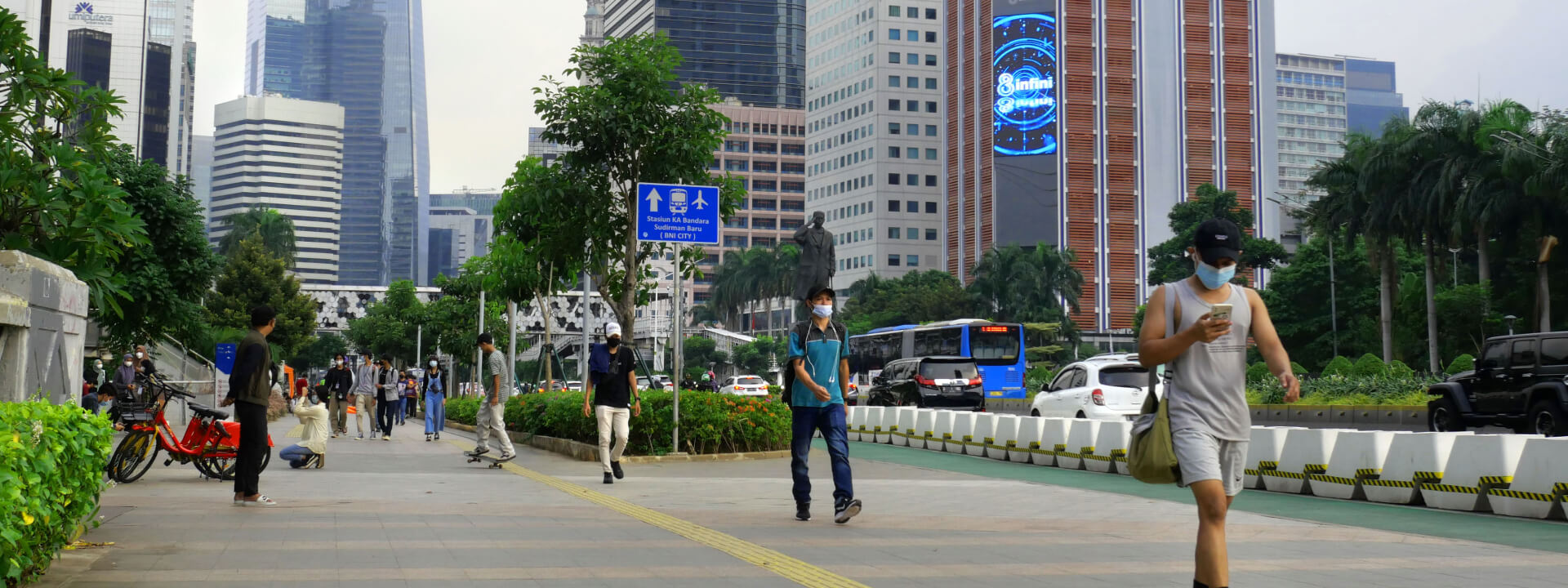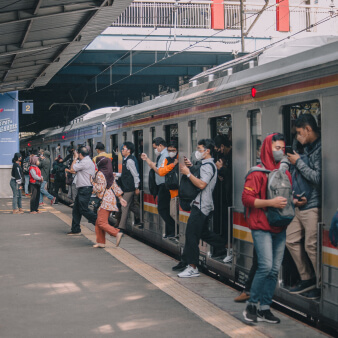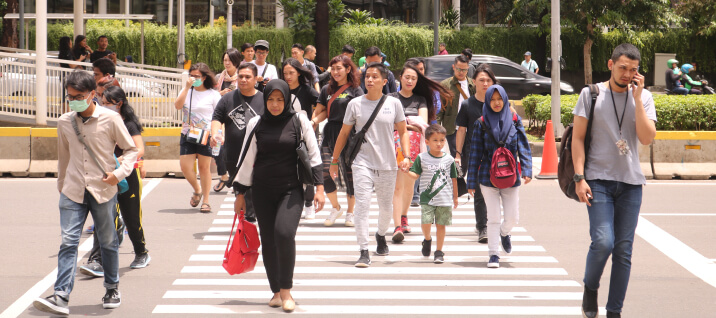
Staying healthy & safe.
Your health and safety is our biggest priority. When you travel with Acicis, we’re dedicated to looking out for you and preparing you with all the information you might need.
Your health and safety are our priority.
Making sure you feel safe and supported while you’re in Indonesia is our biggest priority. With support available 24/7 in-country, we take extensive measures to ensure the well-being of all students during their study abroad experience.
After exploring the health and safety information here and in your program handbook, provided to you after acceptance onto an Acicis program, don’t hesitate to get in touch with our team if you have any remaining questions.



Pre-departure preparation.
The best way to ensure your health and safety in Indonesia is to prepare well! We’ve put together the most important things to consider before you head off for your study abroad experience:
Vaccinations
Before travelling to Indonesia, it’s important to ensure that your vaccinations are up-to-date. Make sure to check in with your GP or travel doctor for recommended vaccinations well in advance of your departure date.
Personal medications
Before leaving your home country, ensure you have a large enough supply of any personal medications to last throughout your experience.
If you take any prescription medications regularly, ensure you carry them with you in your carry-on luggage, along with a copy of the prescription and a letter from your doctor explaining the need for this medication.
Some medications are illegal in Indonesia so let Acicis know if you are concerned about any medications you will be taking and we can check their current status for you.
Travel insurance
You will need travel insurance with coverage for hospitalisation and emergency medical repatriation. This requirement is compulsory for all participants and will be required as part of the visa application process.
If you are a student, check in with your university as you may be covered by their travel insurance policy.
In-country support & considerations.
24/7 in-country support.
We are committed to providing strong in-country support so you can feel at ease during your studies and adventures.
Our commitment to your safety extends beyond just planning—we provide 24/7 in-country support to ensure that you feel secure and supported throughout your stay. From the moment you arrive in Indonesia, our local staff will be there to guide you through any challenges you may face, whether they are related to health, safety, or cultural adaptation.
Smartphone & Indonesian SIM card
For security reasons, all participants are required to have a smartphone, with an active Indonesian SIM card while in Indonesia. You’ll be able to purchase a SIM card upon arrival.
This is to help us provide you with 24/7 in-country support. Once you arrive in-country, staying connected to other students and Acicis staff via Whatsapp groups, general calls and SMS is crucial.
You’ll be required to save the contact details of all Acicis staff members so that you can easily stay in contact. It’s also important that you let Acicis staff know of any travel plans you have in your free time. This is simply so that we always know where you are in case of an emergency
Emergency support.
Thanks to our extensive experience taking care of participants in Indonesia for over 30 years, we have comprehensive risk management plans in place for all of the cities where our programs are run.
In the event of an emergency, having a clear and effective response plan is crucial. As part of our risk management plans, we have developed detailed emergency protocols to ensure that all participants know exactly what to do in various situations. These protocols cover a wide range of scenarios, including natural disasters, political unrest, and personal health emergencies. These plans are also regularly reviewed and updated to address any new developments.
All of our staff are trained to respond quickly and efficiently, coordinating with local authorities and medical facilities to provide the best possible care. In case of an emergency, students will receive immediate assistance and guidance to ensure their safety.
As an Acicis participant you’ll receive comprehensive information on managing risk while in Indonesia during your orientation session.
Safe houses
To support our risk management and emergency plans, Acicis also has safe houses in all program locations. You’ll be made aware of your closest Acicis safe house in your orientation sessions.
Embassy & government ties
Acicis also has strong ties with all relevant embassies and local governments, allowing us to receive real-time updates on any emergency situations.
Personal emergencies
In the event of a personal medical emergency, your insurance should cover the cost of treatment. Keep your insurance details handy, and inform Acicis staff immediately if you require assistance. We can help coordinate with local medical facilities and your insurance provider to ensure you receive the necessary care.
LGBTQI+ support.
Acicis is here to support you throughout your time in-country. To understand the laws and political views in Indonesia, as well as the support we offer, explore the below information.
Is Indonesia a LGBTQI+-friendly country?
Indonesia has a long history of cultural diversity and tolerance, including within its LGBTQI+ communities. While homosexuality remains legal in most parts of the country, with the exception of Aceh province, LGBTQI status is generally only shared among close friends, rather than with strangers or new acquaintances. It’s advisable to take some time to get to know your Indonesian friends and colleagues prior to revealing your sexual orientation.
Acicis support
All Acicis offices are safe and inclusive LGBTQI+-friendly spaces, and homophobia or transphobia from any students, lecturers, host organisation mentors, or colleagues will not be tolerated.
If you experience any of the above while you are in-country, or feel unsafe at any time, please visit an Acicis office, or communicate your concerns with Acicis staff who are there to support you.
Quick health tips.
Being proactive about your health is key to having a safe and enjoyable experience in Indonesia. Here are some of the preventive measures you can take to protect your health during your stay.
Practise good hygiene
Like in all places, practising good hygiene can help keep you healthy. Make sure to wash your hands regularly and consider wearing a face mask in crowded places.
Stay hydrated and eat safely
Dehydration is a common issue in Indonesia due to the hot climate. Make sure to drink plenty of water, ideally boiled or bottled. Avoid consuming tap water and be cautious with ice in areas where hygiene is questionable.
When it comes to food, stick to freshly cooked meals and be wary of raw foods, especially salads and fruits. Eating at well-known and busy establishments can also reduce the risk of foodborne illnesses.
Use mosquito protection
Mosquito-borne diseases like dengue fever are a concern in Indonesia. Speak with your GP or travel doctor about whether you should take anti-malarials. The risk varies significantly depending on where you travel in Indonesia. To protect yourself, use mosquito repellent on exposed skin, wear long sleeves and pants during dusk and dawn, and consider sleeping under a mosquito net if you’re in a high-risk area.
Get Insurance
Understanding your insurance options and coverage is an essential part of staying safe and healthy during your time in Indonesia.
All Acicis participants are required to have comprehensive insurance that covers them during their stay in Indonesia. This insurance should include coverage for medical emergencies, hospitalisations, and evacuations. Check with your insurance provider to ensure your policy meets these requirements and bring a copy of your insurance policy with you.
Mental health support.
Even though psychiatric and psychological services are limited in Indonesia, there has been a rise in online services both from your home country and in Indonesia. Make a support plan with your doctor and/or psychologist before coming to Indonesia.
Frequently asked questions.
Is Indonesia safe?
Yes, Indonesia is generally a safe place to live and study. However, it’s important to exercise a normal degree of caution when travelling.
Acicis has a big team in Indonesia that offer 24/7 in-country support for participants, and comprehensive risk management plans in place to make sure you are well-supported throughout your study abroad experience. Additionally, highly detailed safety information will be provided in pre-departure and orientation sessions and materials. If you have any specific concerns, please feel free to contact our team today.
What should I expect if I need to visit a hospital in Indonesia?
Visiting a hospital in Indonesia is similar to visiting one in your home country, though there may be some differences in language and procedures. Acicis staff will assist you with any hospital visits to ensure you understand the process and receive the care you need. You will also receive more specific information related to hospital visits in your specific program handbook.
What items should I bring if I need to stay in the hospital?
The biggest issue most students face when staying in a hospital in Indonesia is boredom, not fear. If you’re staying in a hospital, bring comfortable clothing, including pyjamas, your phone charger, and items for entertainment, such as books, a laptop, or a tablet.
Is my medication illegal in Indonesia?
Some medications are illegal in Indonesia. However, bringing a sufficient supply of prescribed medication is generally not a problem as long as you carry it in its original packaging and bring a supporting letter from your prescribing doctor. If you’re unsure about the legality of your prescribed medications in Indonesia, please contact our team with the details of your medication for guidance.
What should I do if I get sick in Indonesia?
If you experience any health issues while in Indonesia, the first step is to visit a hospital’s polyclinic for a consultation. Acicis staff can help you with registration and ensure you receive proper care. Depending on your condition, the doctor may prescribe medication or recommend further treatment. In more serious cases, Acicis staff will assist with hospital admission and any necessary arrangements.
What are the common health risks in Indonesia?
Common health risks in Indonesia include dehydration, food-related illnesses like “Bali Belly,” and mosquito-borne diseases such as dengue fever. It’s important to stay hydrated, practise good hygiene, and use mosquito repellent to minimise your risk. Acicis provides detailed information on how to stay healthy during your stay, and our staff are available to assist with any health concerns that arise.
Are there any scams I should be aware of?
Similar to home, you need to be particularly wary of scammers who roam online marketplaces and accommodation search engines demanding large ‘deposits’ or full upfront payment to secure goods or services before disappearing. Follow Acicis’ advice before making any major purchases (e.g. booking accommodation).
Other common scams to be wary of include random unsolicited “prizes” sent by SMS/WhatsApp, calls from strangers, random approaches from overly friendly strangers (particularly near popular tourist destinations) and requests from newfound friends to “borrow” money.
How should I react if a natural disaster occurs?
Thanks to our extensive experience taking care of participants in Indonesia for over 30 years, we have comprehensive risk management plans in place for all of the cities where our programs are run, so you can rest assured that you will be in good hands in the case of a natural disaster.
Detailed information on natural disasters and how to react will be provided in your program’s handbook and during orientation.
Do I need to be aware of terrorism?
You are advised to read carefully the DFAT advice regarding precautionary steps against the threat of terrorism in Indonesia. This advice consists of practical steps that you may take to protect yourself from possible future attacks without having to compromise your lifestyle.
Detailed information on terrorism and how to react will be provided in your program’s handbook and during orientation.
How can I protect myself against harassment?
Before departing on your Acicis adventure, you will complete an online learning module on Preventing Sexual Exploitation, Assault and Harassment (PSEAH). Further information on PSEAH will be provided at orientation.
It is important to note that Indonesians are often very interested in meeting foreigners – especially those who have come to study and live in Indonesia! Some questions westerners consider highly personal are common topics of conversation (e.g. age, religion, marital status). It’s also common for strangers to ask to take a photo with foreign visitors to Indonesia. Please don’t mistake friendliness for harassment, but always remember that you are well within your rights to politely decline to answer any questions or refuse any photo requests if you aren’t comfortable.
Many people you meet (e.g. classmates, colleagues) will be potential new friends. It’s a good idea, however, to think twice before providing your contact details to strangers, particularly outside of campus or the workplace.
All Acicis offices are safe places. If you experience harassment while you are in-country, or feel unsafe at any time, please visit an Acicis office or communicate your concerns with Acicis staff who are there to support you.